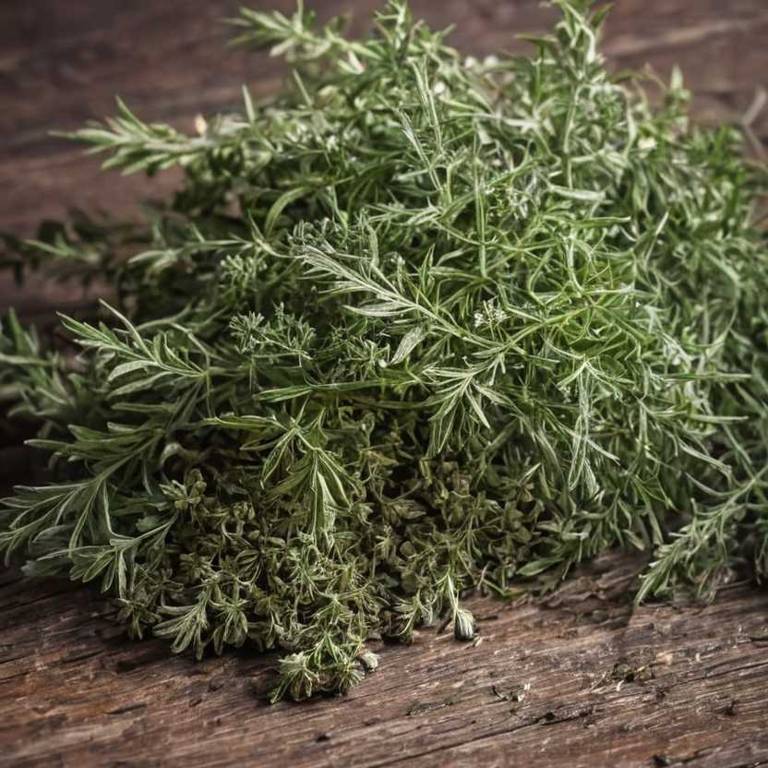10 Best Artemisia Capillaris Preparations

The best medicinal preparations of Artemisia capillaris are teas, decoctions, tinctures, capsules, and creams, each offering unique benefits for health and wellness.
Teas and decoctions are commonly used to support liver function and detoxification.
Tinctures provide a concentrated form for quick absorption of its active compounds.
Capsules offer a convenient and standardized dose for daily use.
Creams are applied topically to address skin conditions and inflammation.
These diverse preparations make Artemisia capillaris a versatile herb in traditional and modern herbal medicine.
Below there's a list of the 10 best herbal preparations of artemisia capillaris for medicinal purposes.
- 1. Teas
- 2. Decoctions
- 3. Tinctures
- 4. Capsules
- 5. Creams
- 6. Baths
- 7. Oinments
- 8. Oils
- 9. Poultices
- 10. Syrups
1. Teas
Artemisia capillaris teas is commonly used to support liver function, detoxification, and digestive health.
This herbal preparation is traditionally used to treat ailments such as hepatitis, jaundice, and digestive disorders like indigestion and bloating. The bioactive constituents responsible for its medicinal properties include flavonoids, triterpenes, and essential oils, which exhibit antioxidant, anti-inflammatory, and cholagogic effects. These compounds help stimulate bile production and improve liver function.
Additionally, Artemisia capillaris may aid in reducing fever and supporting immune function.

2. Decoctions
Artemisia capillaris decoctions is commonly used to treat liver disorders, jaundice, and digestive issues.
This herbal preparation is widely recognized in traditional Chinese medicine for its detoxifying and cholagogic properties. It is often used to support liver function and alleviate symptoms associated with hepatitis and gallbladder problems. The bioactive constituents include flavonoids, sesquiterpene lactones, and essential oils, which contribute to its anti-inflammatory, antioxidant, and hepatoprotective effects.
These compounds help in reducing inflammation and promoting the elimination of toxins from the body.

3. Tinctures
Artemisia capillaris tinctures is commonly used to support liver health, detoxification, and the treatment of skin conditions such as eczema and psoriasis.
These preparations are also traditionally used to address digestive issues, including bloating and indigestion, and to support the immune system. The most common medicinal uses include treating liver disorders, skin inflammation, and gastrointestinal discomfort. The bioactive constituents responsible for these effects include flavonoids, sesquiterpene lactones, and essential oils, which possess anti-inflammatory, antioxidant, and hepatoprotective properties.
These compounds work synergistically to enhance the body's natural detoxification processes and promote overall wellness.

4. Capsules
Artemisia capillaris capsules is commonly used to support liver health, promote detoxification, and alleviate symptoms of digestive disorders.
They are frequently employed in traditional medicine to treat ailments such as jaundice, hepatitis, and gastrointestinal issues. The bioactive constituents responsible for these effects include flavonoids, sesquiterpene lactones, and essential oils, which exhibit antioxidant, anti-inflammatory, and cholagogue properties. These compounds help stimulate bile production and enhance liver function.
Additionally, some studies suggest potential benefits in managing metabolic disorders and reducing oxidative stress in the body.

5. Creams
Artemisia capillaris creams is commonly used to treat skin conditions and inflammatory disorders.
These creams are often applied for their antifungal, antibacterial, and anti-inflammatory properties. They are frequently used to address eczema, psoriasis, and fungal infections such as athlete's foot. The bioactive constituents include flavonoids, terpenoids, and essential oils, which contribute to their therapeutic effects.
Additionally, these creams may support liver health and aid in detoxification processes.

6. Baths
Artemisia capillaris baths is commonly used to treat skin conditions and detoxify the body.
This herbal preparation is often employed for ailments such as eczema, psoriasis, and fungal infections due to its antimicrobial and anti-inflammatory properties. It is also used in traditional medicine to alleviate symptoms of liver disorders and improve overall skin health. The bioactive constituents responsible for these effects include flavonoids, sesquiterpene lactones, and essential oils, which exhibit antioxidant, antifungal, and hepatoprotective activities.
These compounds work synergistically to provide the therapeutic benefits associated with Artemisia capillaris baths.

7. Oinments
Artemisia capillaris oinments is commonly used to treat skin conditions, digestive issues, and liver disorders.
These oinments are often applied topically for their anti-inflammatory and antifungal properties, and internally for detoxification and bile stimulation. The most common ailments treated include eczema, psoriasis, jaundice, and digestive discomfort. Bioactive constituents such as flavonoids, sesquiterpene lactones, and volatile oils contribute to its medicinal effects.
These compounds exhibit antimicrobial, hepatoprotective, and choleretic activities.

8. Oils
Artemisia capillaris oils is commonly used to treat liver disorders, digestive issues, and skin conditions.
This herbal preparation is widely recognized for its ability to support detoxification processes in the body and alleviate symptoms of hepatitis and gallbladder disease. It is also used topically to address fungal infections and inflammatory skin conditions such as eczema and psoriasis. The bioactive constituents responsible for its medicinal properties include flavonoids, sesquiterpene lactones, and essential oils, which exhibit anti-inflammatory, antioxidant, and antimicrobial activities.
These compounds contribute to its effectiveness in promoting liver health and combating various infections.

9. Poultices
Artemisia capillaris poultices is commonly used to treat skin conditions, digestive issues, and liver disorders.
These poultices are often applied externally to reduce inflammation, soothe skin irritations, and promote healing. Internally, they are used to support liver function and alleviate symptoms of jaundice and gallbladder problems. The bioactive constituents responsible for these effects include flavonoids, sesquiterpene lactones, and essential oils, which exhibit anti-inflammatory, antioxidant, and hepatoprotective properties.
This herbal preparation has been traditionally valued in Chinese medicine for its ability to detoxify the body and improve overall health.

10. Syrups
Artemisia capillaris syrups is commonly used to support liver function and treat conditions such as hepatitis and jaundice.
These syrups are also used to alleviate symptoms of digestive disorders, including indigestion and bloating. The medicinal properties of Artemisia capillaris syrups are attributed to bioactive constituents such as flavonoids, sesquiterpenes, and essential oils. These compounds have antioxidant, anti-inflammatory, and hepatoprotective effects.
Additionally, they may help in detoxification processes within the body.
